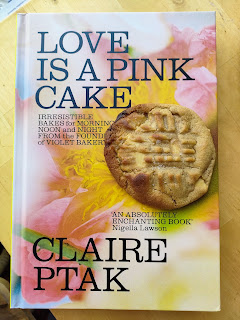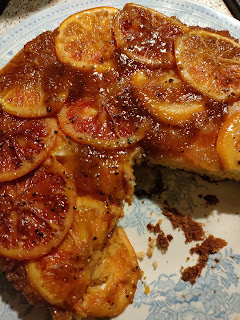Life really does keep getting in the way at the moment. I've got a jumper minus its sleeves that I really wanted to finish before the weather warmed up too much to wear it, an almost literal ton of books to read, work is busy and a whole lot of personal stuff going on in the background. The days are flying by. There are books to write about as well, but they deserve a slightly more positive frame of mind than I'm feeling today so this is a quick post to celebrate an impulse buy that's come through with the feel good factor.
I don't need anymore cook books, specifically not baking books, and pink isn't really my aesthetic but when I unpacked Claire Ptak's Love is a Pink Cake at work the other day I decided to bring it home, reasoning that if it was't for me I'd pass it on to my youngest sister.
The recipe that grabbed me was for Ras el Hanout Snickerdoodles, the one I've made this morning was the blonde peanut butter cookies. Sorry Sophie, I think this one's a keeper. Claire Ptak has the Calafornia style Violet bakery in East London and whilst I think I had her earlier book I also know I didn't keep it - the combination of London and California isn't really my thing, and the Americanised measurements, although practical for a book to be sold on both sides of the Atlantic normally put me off a bit.
On the other hand you can't argue with the perfect salty, nutty, chewy, sweet, cookie - so what do I know. Blonde chocolate has started to appear everywhere recently, though in some ways the Caramac's of my childhood remain unbettered (yes, a Caramac is weirdly waxy and gritty in texture, but it tastes of nostalgia and quality has no chance against that). I want to like it, but it's toothachingly sweet and again not really my thing. It blends perfectly with peanut butter though.
This recipe also adds a touch of lemon juice to balance the sweetness and some wholemeal flour (I had rye and used that instead which I like for it's nutty edge). It said it would make 12 cookies, but I ended up making 18 because I like them slightly smaller and it's handy to have a couple of batches worth in the freezer against a rainy day. I had M&S chocolate this time and was glad to use it up, but I'm thinking of making these again with the Caramac's that I spotted in a pound shop whilst looking for coronation window dressing (and doesn't that say everything about the general level of excitement for the first coronation this country has seen in 70 years). If they work out I'll post the recipe.







.jpg)






